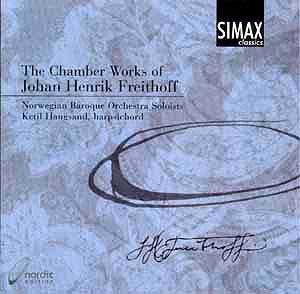|
|
Search MusicWeb Here |
|
 |
||
|
Founder:
Len Mullenger (1942-2025) Editor
in Chief:John Quinn
|
|
|
Search MusicWeb Here |
|
 |
||
|
Founder:
Len Mullenger (1942-2025) Editor
in Chief:John Quinn
|
 |
Johan Henrik FREITHOFF (1713-1767)
|
|
Crotchet AmazonUK AmazonUS |
|
As a reviewer of classical recordings, there are several main pleasures: hearing great works performed by great performers, hearing familiar works performed with new insight by young performers, and, much rarer, discovering music by unknown or forgotten composers. This disc offers a chance to do the latter - discover the chamber music of a little-known, and barely recorded Norwegian composer, Johan Henrik Freithoff. |
|
Return to Index |